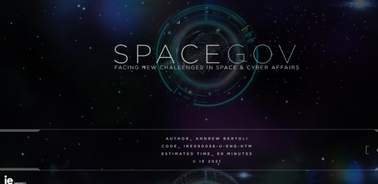- Home
- News And Events
- News
- Ie University Designs A Technological Simulator To Solve Global Aerospace Governance Challenges
IE University designs a technological simulator to solve global aerospace governance challenges

This futuristic simulator helps students understand the challenges of collective action in global politics, space debris management and cyber-attacks within global governance.
IE University's IE Publishing team has recently developed a multiplayer simulator that allows students to analyze, make real-time decisions and solve global aerospace governance challenges. The interactive simulation brings students and professors together to work on designing collective action strategies on aerospace governance and propose solutions to challenges such as waste management, satellite delivery or cyberattacks faced by countries and regions in the new space age.
Among the challenges posed by the simulator is limiting aerospace capacity: countries have the capability to put satellites into orbit, but if space becomes saturated, it could make outer space unusable. Students, who represent the interests of different countries and world regions in the simulator, must analyze these and other issues and ensure sufficient negotiating capacity so as to use space in a collaborative and sustainable manner.
A second challenge involves technological advancement. In the simulator, countries can improve their space and cyber power through research. In addition, they can strengthen their technological leadership through cooperative exchange or cyberattacks on adversarial countries. How players allocate technological investment is a key aspect. In addition, students confirm within the simulator that space cyberattacks weaken rival countries, which generates conflict and drives the search for negotiated solutions closer to real environments. Students obtain different possible outcomes depending on the strategy adopted and the cooperative or competitive nature of the management. Students end their simulator experience with a class discussion where the teacher highlights all the learning objectives covered during the simulator. This session is supported by the use of the extensive analytics provided by the simulator.
“This simulation makes students confront emerging challenges in the space and cyber realms that matter a great deal now and will likely become increasingly important in the coming years. Students strategize and negotiate around these challenges, learning many academic and policy-relevant skills in the process,” says Andrew Bertoli, the IE University professor who designed the “Facing New Challenges in Space and Cyber Affairs” simulator with the IE Publishing team.
“These types of immersive experiences are of great added value in today's education. Students adapt new roles and interact and negotiate in highly realistic environments, deepening the learning process and making it more fun,” says Martín Rodríguez Jugo, Director of IE University Publishing & Executive Education Online.
“With the support of technology, we maximize efficiency and meet our learning objectives. In addition, managing space arouses great interest in students, who debate it at the highest level.”
Martín Rodríguez Jugo, Director of IE University Publishing & Executive Education Online
This futuristic simulator based on game theory and the principles of social constructivism helps students understand the challenges of collective action in global politics, as well as how to deal with new challenges such as space debris management and cyber-attacks within global governance, which are extremely important issues in today's world.
IE University Publishing designs and develops educational resources that include multimedia cases, interactive tutorials, simulators, both single and multiplayer, and various online courses, such as Massive Open Online Courses (MOOCs). The IE University Publishing team has also been working for several years on the development of learning experiences with virtual reality technologies. More information here.